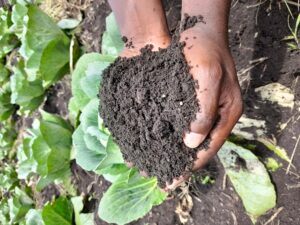 We are carrying out the following activities under Agro-ecology.
We are carrying out the following activities under Agro-ecology.
- We train women, men and young people on effective organic vegetable gardening, fruit growing and agro-ecology principles.
- We train women and youth on making organic pesticides and manure.
- We provide vegetable seeds, fruit seedlings and farming tools to our trainees.
- We integrate Financial management in our farming training.
When women, men and young people are empowered on how to produce their own organic vegetables they will be able to use less inputs to produce the vegetables to feed their families, and even sell some for income. The knowledge and skills in agroecology enables our benefiting families to produce food sustainably while promoting long-term environmental health, biodiversity and the efficient use of resources.
Women and young people will conserve water both in homes and gardens increasing the amount of water available to support gardening and household usage reducing wasted time by women on finding water to use.
Agroecology emphasizes diverse cropping and integrated farming practices contributing to a more resilient and stable food supply. It will also reduce vulnerability of local communities to fluctuation shocks of commodity prices.
Detailed Agroecology
Regenerative and agroecological practices and principles integrate economic, ecological and social values in tackling challenges and finding opportunities and these are core factors in our operation model. Through this, we teach target women, children and youth mechanisms on land design and management, preparation of nursery beds, crop management, harvest and post-harvest management of crops organically. This includes training target populations on making organic manure and pesticides, planting companion crops, cover crops, mixed farming and agroforestry that help to improve soil health that helps farmers to adapt to climate change, sustainably use and conserve natural resources and biodiversity. This methodology enables our target beneficiaries to use low cost mechanisms for production of highly nutritious foods thus reducing hunger, malnutrition and higher profits. By implementing this model, we recognize the importance of living together in a more interconnected way with ourselves, each other and the earth and helping individuals environmentally friendly lifestyles hence increasing access to enough food.
